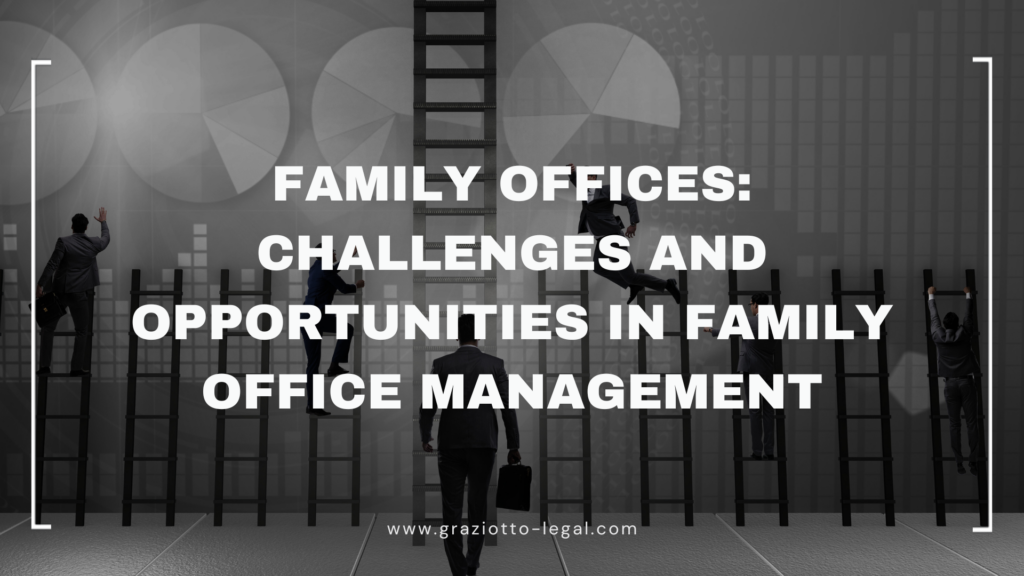

Since 2010, the Global Law Experts annual awards have been celebrating excellence, innovation and performance across the legal communities from around the world.
posted 10 hours ago
In the ever-evolving financial and economic landscape, family offices, despite their specialized nature, are not immune to the challenges posed by global economic shifts and market fluctuations. In today’s interconnected financial markets, even small economic tremors in one corner of the globe can have ripple effects, creating challenges for family offices everywhere.
The first challenge is the macroeconomic environment. With fluctuating interest rates, inflationary pressures, and unpredictable GDP growth in many economies, family offices often grapple with uncertainties when it comes to investment decisions. For instance, a rising interest rate scenario might be good for bond yields but can pose significant challenges for those invested heavily in equities or real estate.
Another significant challenge is market volatility. The last decade has seen episodes where markets have been extremely volatile due to geopolitical tensions, global health crises such as the COVID-19 pandemic, and technological disruptions. During such times, the valuation of assets held by the family office can experience significant fluctuations, challenging the stability and consistent growth of the portfolio.
Currency fluctuations present another layer of complexity. With many family offices having cross-border investments, they have to manage the risk associated with currency movements. An unfavorable movement in currency rates can erode the value of overseas investments significantly.
Additionally, the rise of alternative investments like cryptocurrencies and other digital assets poses both an opportunity and a challenge. While they offer diversification and potentially high returns, they also come with high volatility and regulatory ambiguity in many jurisdictions.
The last economic challenge worth highlighting is the liquidity management. With the nature of some investments held by family offices, like real estate or stakes in private companies, they aren’t easily liquidated. This can pose a challenge when the family needs liquidity for unforeseen expenses or wants to capitalize on a new investment opportunity.
In the face of these challenges, family offices have to be proactive. This involves diversifying their investment portfolios to hedge against market volatilities, employing financial experts who can navigate the complexities of the global economy, and leveraging financial technology tools that provide real-time insights into market movements and risks.
In conclusion, while economic and market challenges are inherent to any investment venture, family offices, due to their unique nature, need a tailored approach. They need to blend traditional wisdom with modern tools and expertise to navigate these challenges successfully.
A deeper dive into the economic challenges reveals the intricacy of managing family wealth in today’s global scenario. For instance, the challenge of inflation isn’t just about rising prices. For family offices, it’s about understanding the nuances of inflation hedging. Real assets such as real estate or commodities might serve as a hedge, but they come with their challenges like illiquidity or price volatility.
Moreover, geopolitical events are becoming more unpredictable. Trade wars, regional conflicts, and nationalist policies can alter the investment landscape overnight. For a family office with holdings in multiple countries, this means they need to be on top of not just economic indicators, but also geopolitical ones.
Then there’s the challenge posed by black swan events – unpredictable events that have massive ramifications. The 2008 financial crisis and the COVID-19 pandemic are prime examples. Such events can wipe out years of gains in a matter of weeks. For family offices, which often have the dual mandate of preserving wealth and ensuring its growth, such events can be catastrophic.
However, it’s not all gloom and doom. These challenges, while significant, also present opportunities. The volatility can be turned to advantage by those who can see and seize opportunities quickly. For instance, post the initial shock of the pandemic, many assets were available at distressed prices, providing a golden opportunity for those with liquidity to invest.
To successfully navigate these challenges, family offices must ensure that they have a robust risk management strategy in place. This strategy should not just be about diversifying investments but also about understanding correlations between different asset classes and continuously monitoring and adjusting the portfolio as per the changing economic landscape.
Furthermore, continuous education is crucial. The economic and investment landscape is evolving rapidly, with new asset classes like digital assets emerging and old ones like bonds or equities undergoing transformations. Ensuring that the family and the office executives are up- to-date with these changes is vital.
Lastly, in the face of these challenges, collaboration can be a valuable strategy. Collaborating with other family offices, joining investment consortiums, or being a part of global family office forums can provide insights, diversification, and risk-sharing opportunities.
One of the most nuanced challenges in this domain is the family office’s capability to forecast and respond to economic cycles. Economic cycles, including periods of growth and recession, profoundly influence asset prices, interest rates, and investment opportunities. Family offices must understand the stage of the economic cycle to make informed investment decisions.
To navigate the complexity of economic cycles, family offices should consider the use of economic indicators. These can range from leading indicators like stock market returns and manufacturing activity to lagging indicators like unemployment rates. Understanding these indicators and how they correlate with various investment opportunities can provide a better footing for investment decisions.
Technology is also playing a crucial role in shaping the economic landscape, and it can be both a challenge and an opportunity. The rise of fintech has made it possible for family offices to access real-time data, employ sophisticated algorithms for investment decisions, and automate many mundane tasks.
However, the technological landscape itself is rapidly evolving, and staying abreast of these changes requires continuous investment in technology and training. The emergence of sustainable investing also poses a unique challenge and opportunity.
With an increased focus on Environmental, Social, and Governance (ESG) criteria, there is pressure and also a desire by many families to align their investment portfolio with these values. While it opens up new investment avenues, it also requires a deep understanding of these principles and the ability to assess investments from an ESG perspective.
Furthermore, taxation plays a vital role in the overall profitability of investments. Changes in tax laws and regulations across different jurisdictions can significantly impact the net return on investments. Understanding and planning for these changes requires legal and financial expertise, and failure to comply can lead to penalties and reputational damage.
Considering these multi-dimensional challenges, it’s evident that family offices cannot operate in silos. They must build a network of trusted experts including economists, legal experts, and financial advisors who understand the specific dynamics of the family’s wealth and can provide tailored advice.
Building a flexible investment strategy is equally important. This involves not just diversifying across asset classes but also across geographies and time horizons. It means having the agility to move funds between different investments quickly in response to a changing economic environment.
Continuing with the exploration of economic and market challenges faced by family offices, we can delve deeper into specific strategies, tools, and best practices that can be employed.
Family offices must cultivate a global perspective. Global economic forces, such as inflation, deflation, changes in commodity prices, and fluctuations in currency exchange rates, can significantly impact investments. Using tools such as economic forecasting models and regularly consulting with macroeconomic experts can help in understanding and predicting these global trends.
Leveraging big data analytics and artificial intelligence can provide insights into market trends and consumer behavior. Predictive analytics can help in identifying potential investment opportunities or warning signs early on. Investing in the right technology and building a team with strong analytical skills can provide a competitive edge.
A comprehensive risk management strategy is vital to navigate economic challenges. This includes identifying potential risks, assessing their impact, and developing mitigation strategies. Scenario planning, stress testing, and risk modeling are some of the tools that can be used in this context.
Implementing a rigorous approach to sustainable investing, focusing on ESG criteria, can align investment practices with ethical principles and potential long-term value creation. Certifications and standardized reporting can enhance transparency and trust with stakeholders.
Economic and market challenges often require a legal and regulatory response. Engaging proactively with regulators and industry bodies can provide early insights into potential changes in the legal landscape and an opportunity to influence policy in favor of responsible investing.
Comprehensive tax planning and optimization require a deep understanding of international tax laws and regulations. Engaging with tax experts and legal advisors who specialize in international taxation can help to minimize tax liabilities and ensure compliance.
Building relationships with other investors, banks, and financial institutions can provide additional insights into market trends and opportunities. Collaborating on certain investments can also reduce risk.
Continuous training and development of the team are essential to keep up with the ever-changing economic landscape. Regular workshops, training sessions, and participation in industry conferences can keep the team abreast of the latest trends and technologies.
An IPS that is flexible and allows for rapid adjustments in response to economic changes is vital. Regular reviews and updates of the IPS to reflect current market conditions can provide a clear and agile investment roadmap.
In a family office setup, educating and engaging with family members about the economic landscape, investment strategies, risks, and opportunities is essential. Regular family meetings and reports can foster a sense of ownership and alignment with the investment strategy.
The economic and market challenges are complex, but they are not insurmountable. By adopting these strategies, tools, and practices, family offices can turn challenges into opportunities. The journey requires continuous learning, agility, collaboration, ethical consideration, and an unrelenting focus on long-term goals.
The landscape of economic challenges is as dynamic as the market itself, and the family offices that succeed in this environment will be those that view these challenges as opportunities to innovate, grow, and create value.
Economic and market challenges faced by family offices are complex, multifaceted, and ever-evolving. They require a blend of traditional financial acumen, understanding of global economic dynamics, technological savviness, and an agile approach to investment.
By adopting a proactive approach, continuous learning, leveraging technology, engaging with a network of experts, and fostering collaboration, family offices can not only navigate these challenges but also find unique opportunities for growth and value creation.
Family offices that see these challenges not as obstacles but as catalysts for growth, innovation, and evolution will position themselves well in the dynamic and competitive global economic landscape.
For more in-depth information you can consult my latest book «The Global Manual for Family Offices», Volume 1, Chapter 4.3.1, Pg. 271.
Author


No results available
Resetposted 3 hours ago
posted 3 hours ago
posted 1 day ago
posted 2 days ago
posted 4 days ago
posted 5 days ago
posted 6 days ago
No results available
ResetSign up for the latest advisory briefings and news within Global Advisory Experts’ community, as well as a whole host of features, editorial and conference updates direct to your email inbox.
Naturally you can unsubscribe at any time.
Global Advisory Experts is dedicated to providing exceptional advisory services to clients around the world. With a vast network of highly skilled and experienced advisers, we are committed to delivering innovative and tailored solutions to meet the diverse needs of our clients in various jurisdictions.